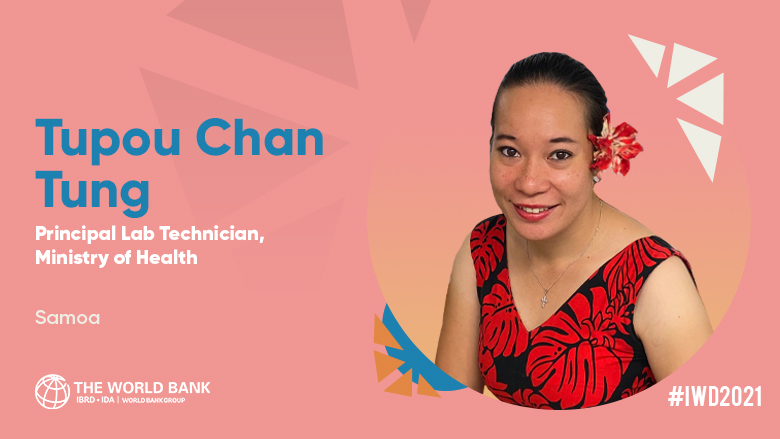What inspired you to enter the medical field?
I grew up in Samoa, but my dad was a diplomat, so we moved to Belgium when I was 13. I completed high school there. I have continuously sought out ways to assist those who are less fortunate. I was always wanting to help other people.
During school I was really interested in the sciences and the ever-changing environment of the Medical Sciences appealed to me. So, in 2011, I studied Biomedical Science at La Trobe University in Melbourne, Australia. I returned to Samoa in 2014 and started working at the hospital. With the work I do in the lab, I am never bored. You get to work with all sorts of people, not just people in the medical field, but a wide array of people from different backgrounds. So my interest in helping people and doing varied work all comes together in the Medical Sciences.
What does your job as a Principal Lab Technician with the Ministry of Health actually involve?
Before the pandemic, we were in the process of establishing the first public health laboratory in the Pacific. It is a major goal spearheaded by our Director General of Health. I am part of the task force in setting it up, and the World Bank has been vital in helping it progress. I spent five years in a medical laboratory in the Microbiology units, and so working with infectious diseases has always been an interest of mine. And when the opportunity came up to establish a public health laboratory, I was all ears, eyes and feet to it!
Of course, since the pandemic began, we have needed to increase laboratory capacity and there's a lot of screening that takes place to pinpoint carriers of COVID-19.
How did your role change when the pandemic began?
When COVID-19 hit, everything became fast-tracked. Everyone had to be multi-skilled. We had to be able to do data analysis of the global and local situations to inform strategies on screening and monitoring of Samoan citizens stuck abroad for their safe repatriation.
Initially, I started going to the airport to accompany repatriated citizens to allocated quarantine sites and assist in gathering information, mainly with surveillance, to help update our travel advice. I also worked alongside the teams that are at the airport to collect swabs for testing and screening. So, I've been heavily involved with the screenings involved at the airport and subsequent contact tracing in terms of disease surveillance. We are in a preparedness phase right now and we're also preparing for the vaccine implementation.
This year's IWD theme is 'Women in Leadership'. Is there a female leader that inspires you?
In Samoa, there's a lot of encouragement for women to progress and so there's a lot of women in management roles. When I started working in a medical laboratory, I had a woman who was our manager and she inspired me, and now I am working heavily with our sector coordinator and she's also inspired me in a lot of ways. But, an individual is not only a result of a family, but also a village, and also the community; in this case, the workforce. So it's quite difficult to pinpoint exactly who the biggest inspiration is, but I've been quite fortunate to have a lot of women in leadership roles that encourage me.
What are your hopes and plans for the future?
Given COVID-19, the establishment of the public health laboratory is a huge goal right now. Establishing it and seeing it come to life, so that we can best assist with effective decision-making in the region will be a wonderful achievement.
Finally, what do you miss most about Samoa when you are away from home?
Everything. It's the way of life, the people, our local communities, the church and it’s home; a sense of belonging. On Sundays, everyone drops what we are doing, and we go to church. And the choir sings loudly, which is always a pleasant unique experience to be a part of.
Follow World Bank Pacific on Facebook to make sure you don’t miss any of our Pacific Women in Leadership series.
**The views expressed in this interview do not necessarily represent the views of the World Bank Group and its employees.

